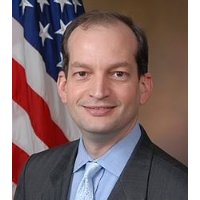Secretary of Labor: Who Is Alex Acosta?
 Alex Acosta
Alex Acosta
In Alex Acosta, President Donald Trump selected someone to head the Department of Labor who is certainly less controversial than his first candidate, fast-food magnate Andrew Puzder, but whose background suggests his policies will be no less conservative. Rene Alexander “Alex” Acosta was confirmed as the new Secretary of Labor by a 60-38 vote of the U.S. Senate on April 27, 2017.
Acosta was born January 16, 1969, in Miami, the only child of Rene and Delia Acosta, both of whom had come to the United States from Cuba as teenagers. His mother would work as a paralegal and his father in a cellphone store. Acosta went to Gulliver Prep, skipping his senior year after early acceptance to Harvard. At Harvard, he earned a B.A. in economics in 1990.
After graduation, Acosta worked for a short time as an investment banker for Shearson Lehman Brothers, but returned to Harvard for law school and earned his J.D. in 1994. He then worked for a term as a clerk for Samuel Alito, then a judge on the Third Circuit Court of Appeals, later a Supreme Court justice.
The following year, Acosta began at the Kirkland and Ellis law firm, giving him his first look at labor relations from management’s point of view. Kirkland and Ellis boasts on its website of its expertise in union avoidance, decertifications and other anti-union activities. He also taught classes at George Mason University on employment law, disability-based discrimination law and civil rights law.
In 1997, Acosta moved to the Ethics and Public Policy Center, a conservative think tank “dedicated to applying the Judeo-Christian moral tradition to critical issues of public policy.”
Acosta was part of the George W. Bush campaign’s Florida recount effort, and joined the administration after the inauguration as principal deputy assistant attorney general in the Office of Civil Rights. In 2002, he was appointed to a seat on the National Labor Relations Board.
The following year, Acosta was back at the Office of Civil Rights, this time as its chief. He made it a point to lead campaigns against human trafficking. On the other hand, he was caught up in some controversial actions that would return to haunt him later in his career.
Early in his tenure, an Acosta underling, Bradley Schlozman, was put in charge of hiring in the office. Scholzman was later found by the Justice Department’s Inspector General and Office of Professional Responsibility to have unlawfully used applicants’ political leanings to decide whether they’d be hired for civil service jobs in the division. “My tentative plans are to gerrymander all of those crazy libs rights out of the [voting rights] section,” Scholzman wrote in an email. Acosta wasn’t directly implicated, but, according to the report, he and others had “sufficient information about Schlozman’s conduct to have raised red flags warranting closer supervision of him.”
Then, during the 2004 election, the Ohio Republican Party sent letters to mostly African-American voters in that state to verify that they were living at their registered address in a tactic known as “caging.” If the voters don’t respond, the registrar of voters is asked to purge that person from the rolls. That case went before a judge and Acosta sent the judge an unsolicited letter, just days before the election, asking for a ruling in favor of the Republicans.
In 2005, Acosta was made U.S. Attorney for the Southern District of Florida. Among cases his office tried under his supervision were one involving lobbyist Jack Abramoff, who pleaded guilty to wire fraud and conspiracy in a casino deal; and Jose Padilla, who was accused of planning a “dirty bomb” attack and was sent to prison.
Acosta also cut a deal with Palm Beach financier Jeffrey Epstein, a social acquaintance of Donald Trump, who was accused of operating an international sex ring involving underage girls. In the deal, Acosta turned prosecution over to the state of Florida, which charged Epstein with a relatively minor offense and he got off with a 13-month sentence.
After Bush left office, Acosta was made dean of the law school at Florida International University (FIU) in Miami. In 2013, he also was made chairman of U.S. Century Bank, a troubled institution that has close ties to FIU.
On March 29, 2011, Acosta presented Senate testimony in support of protecting the rights of U.S. Muslims, concluding, “As a nation, we have not forgotten the events of ten years ago. Emotions remain charged, and the desire to blame remains high. Now is good time to remember
that no community has a monopoly on any particular type of crime.”
In 2014, Acosta was being considered as dean of the law school at the state’s flagship institution, the University of Florida. However, his name was taken off the short list after concerns about his conduct while running Bush’s Office of Civil Rights.
Acosta and his wife, Jan, have two children.
-Steve Straehley
To Learn More:
Trump’s Labor Pick Is FIU Law Dean and a Former Miami U.S. Attorney (by Jay Weaver, Patricia Mazzei and Nicholas Nehamas, Miami Herald)
The Scandal That May Haunt the New Nominee for Labor Secretary (by Adam Serwer, The Atlantic)
Does New Labor Secretary Nominee Alex Acosta Have the Perfect Résumé to Sabotage a Federal Agency? (Democracy Now)
School Dean Is New Pick for Trump's Labor Chief (by Alan Rappeport, New York Times)
Alex Acosta Testimony on Protecting the Civil Rights of American Muslims (United States Senate Committee on the Judiciary Subcommittee on the Constitutio, Civil Rights and Human Rights)
- Top Stories
- Unusual News
- Where is the Money Going?
- Controversies
- U.S. and the World
- Appointments and Resignations
- Latest News
- Trump Renames National Football League National Trump League
- Trump to Stop Deportations If…
- Trump Denounces World Series
- What If China Invaded the United States?
- Donald Trump Has a Mental Health Problem and It Has a Name






Comments